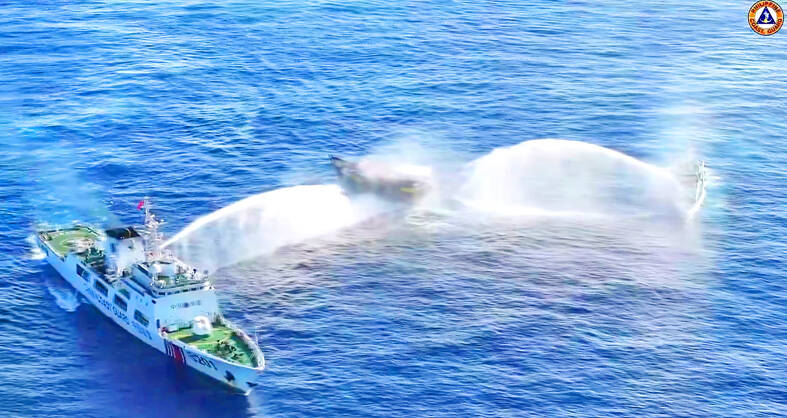Chinese and Philippine coast guard vessels yesterday collided in the disputed South China Sea and four Filipino crewmembers were injured in high-seas confrontations.
The China Coast Guard ships and accompanying vessels blocked the Philippine Coast Guard and supply vessels off the disputed Second Thomas Shoal (Renai Shoal, 仁愛暗沙) and executed dangerous maneuvers that caused two minor collisions between the Chinese ships and two of the Philippine vessels, Philippine officials said.
The BRP Sindangan of the Philippine Coast Guard had minor structural damage from the collision that happened shortly after dawn. Over an hour later, another Chinese coast guard ship first blocked then collided with a supply boat the Philippine coast guard was escorting, the Philippine officials said.

Photo: AFP / Philippine Coast Guard
The supply boat, crewed by Filipino navy personnel, was later hit by water cannon blasts from two Chinese coast guard ships. Its windshield shattered, injuring at least four Filipino crewmembers, a statement from the Philippine government task force dealing with territorial disputes said.
The actions by the Chinese was “another attempt to illegally impede or obstruct a routine resupply and rotation mission,” the task force said.
“China’s latest unprovoked acts of coercion and dangerous maneuvers” against Philippine ships en route to deliver supplies and fresh troops to the Philippine-occupied shoal “put the lives of our people at risk and caused actual injury to Filipinos,” it said.
The Philippine Department of Foreign Affairs summoned China’s deputy ambassador to convey a protest against the China Coast Guard’s actions, which it said were unacceptable.
“The Philippines demands that Chinese vessels leave the vicinity of Ayungin Shoal immediately,” the department said in a statement, using the Philippine name for the contested shoal.
A small Philippine marine and navy contingent has kept watch onboard a rusting warship, the BRP Sierra Madre, which has been marooned since the late 1990s in the shallows of the Second Thomas Shoal.
China also claims the shoal lying off the western Philippines and has surrounded the atoll with coast guard, navy and other ships to press its claims and prevent Filipino forces from delivering construction materials to fortify the Sierra Madre in a decades-long standoff.
The shoal was the site of several tense skirmishes between Chinese and Philippine coast guard ships last year.
The Chinese coast guard said in a statement that “it took control measures in accordance with the law against Philippine ships that illegally intruded into the waters adjacent to Renai Reef,” the name Beijing uses for Second Thomas Shoal.
A Chinese coast guard spokesperson said a Philippine ship deliberately rammed a Chinese coast guard vessel, causing a minor scratch.
Washington strongly condemned the Chinese coast guard’s actions and US Ambassador to the Philippines MaryKay Carlson said that the US stands with the Philippines and proponents of international law.
Australia and Japan separately expressed their concern over China’s actions.

AGING: As of last month, people aged 65 or older accounted for 20.06 percent of the total population and the number of couples who got married fell by 18,685 from 2024 Taiwan has surpassed South Korea as the country least willing to have children, with an annual crude birthrate of 4.62 per 1,000 people, Ministry of the Interior data showed yesterday. The nation was previously ranked the second-lowest country in terms of total fertility rate, or the average number of children a woman has in her lifetime. However, South Korea’s fertility rate began to recover from 2023, with total fertility rate rising from 0.72 and estimated to reach 0.82 to 0.85 by last year, and the crude birthrate projected at 6.7 per 1,000 people. Japan’s crude birthrate was projected to fall below six,

US President Donald Trump in an interview with the New York Times published on Thursday said that “it’s up to” Chinese President Xi Jinping (習近平) what China does on Taiwan, but that he would be “very unhappy” with a change in the “status quo.” “He [Xi] considers it to be a part of China, and that’s up to him what he’s going to be doing, but I’ve expressed to him that I would be very unhappy if he did that, and I don’t think he’ll do that. I hope he doesn’t do that,” Trump said. Trump made the comments in the context

SELF-DEFENSE: Tokyo has accelerated its spending goal and its defense minister said the nation needs to discuss whether it should develop nuclear-powered submarines China is ramping up objections to what it sees as Japan’s desire to acquire nuclear weapons, despite Tokyo’s longstanding renunciation of such arms, deepening another fissure in the two neighbors’ increasingly tense ties. In what appears to be a concerted effort, China’s foreign and defense ministries issued statements on Thursday condemning alleged remilitarism efforts by Tokyo. The remarks came as two of the country’s top think tanks jointly issued a 29-page report framing actions by “right-wing forces” in Japan as posing a “serious threat” to world peace. While that report did not define “right-wing forces,” the Chinese Ministry of Foreign Affairs was

PREPAREDNESS: Given the difficulty of importing ammunition during wartime, the Ministry of National Defense said it would prioritize ‘coproduction’ partnerships A newly formed unit of the Marine Corps tasked with land-based security operations has recently replaced its aging, domestically produced rifles with more advanced, US-made M4A1 rifles, a source said yesterday. The unnamed source familiar with the matter said the First Security Battalion of the Marine Corps’ Air Defense and Base Guard Group has replaced its older T65K2 rifles, which have been in service since the late 1980s, with the newly received M4A1s. The source did not say exactly when the upgrade took place or how many M4A1s were issued to the battalion. The confirmation came after Chinese-language media reported